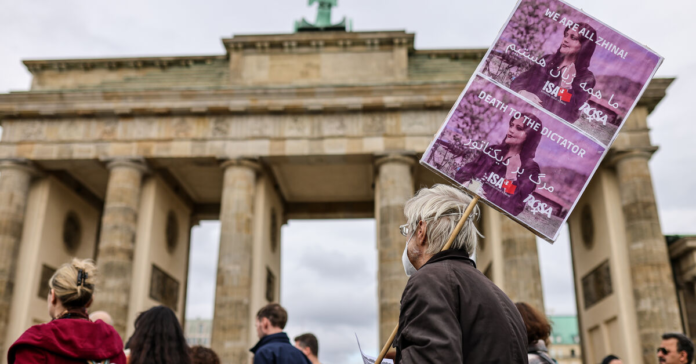December 26, 2022
At the start of 2022, US officials said negotiations with Iran were in their “final stretch,” optimistic that a restored nuclear deal was within reach. One year on, that same deal looks doomed.
President Joe Biden said as much in a newly surfaced video from early November, telling a member of the public that the nuclear accord he campaigned on restoring was “dead.” And although the administration quickly walked back his comment, Biden acknowledged what some experts have been saying about the deal for months.
There is increasing pessimism in Washington that an agreement can be reached to revive the deal abandoned by former President Donald Trump, under which Tehran agreed to curb its nuclear activity in exchange for economic sanctions relief. Already stalled talks to revive the Joint Comprehensive Plan of Action (JCPOA) have taken a backseat to the anti-government uprising sweeping Iran.
To quell the unrest, Iranian authorities have unleashed a bloody crackdown on the peaceful protests that erupted over the Sept. 16 death in custody of Mahsa Amini, a young Kurdish Iranian woman arrested for an alleged violation of the compulsory hijab. More than 500 people, many of them children, have since died in the protests, according to the watchdog group Human Rights Activists in Iran.
Tehran’s violent response to the protests has put the Biden administration in a difficult position: Can it credibly support the protesters while pursuing a nuclear deal that would enrich the very regime oppressing them?
“The political cost of granting Iran significant sanctions relief has increased significantly for the West because of the fact that the Iranian regime is killing its own people on the streets in Iran and also indirectly killing the Ukrainians by providing weapons to Russia,” said Ali Vaez, the Iran project director at the International Crisis Group.
“There’s also little political appetite on the Iranian side to deal with regimes that they believe had a hand fueling the protests in Iran,” Vaez said.
There was optimism for a deal as recently as August, when the European Union presented its “final” proposal to Tehran and Washington after nearly a year and a half of indirect discussions between the two sides. But the talks again broke down after Iran demanded the UN watchdog, the International Atomic Energy Agency, drop its investigation into uranium traces found at three undeclared sites as a condition for reviving the JCPOA. Iran has also sought guarantees that the next US administration won’t abandon the nuclear pact. Both demands are non-starters for Washington.
Months later, the final sticking points remain unresolved. Following a meeting between Iranian Foreign Minister Hossein Amir-Abdollahian and EU foreign policy chief Josep Borrell last week, Tehran signaled it was ready to finalize a deal on the “basis” of the bloc’s August proposal.
But Iran analysts say there’s no evidence to suggest the Iranians have dropped their demands and any signaling to suggest otherwise is likely an effort to halt a run on Iran’s troubled currency.
Despite Iran’s continued stonewalling, US officials have stopped short of declaring the JCPOA dead. In early December, US special envoy for Iran Rob Malley said the Biden administration was “not spending our time now focused on the deal.”
Barbara Slavin, a nonresident senior fellow at the Atlantic Council, said the onus in the negotiations is on Iran.
“There is no pressure whatsoever on the Biden administration to do or say anything about the JCPOA at this point because the ball is entirely in Iran’s court,” she argued. “Iran is the one that has not agreed to a deal that has essentially been ready since last March.”
The United States has struck a noncommittal tone, but that could change next October, when restrictions on missile and related technologies imposed under UN Security Council Resolution 2231, which endorsed the 2015 nuclear deal, are set to expire. Rather than allow the ban to lapse, experts say members of the so-called E3 — Britain, France and Germany — are likely to respond by invoking the “snapback” mechanism, which would force a return of terminated UN resolutions and sanctions.
“There is zero going back at that point” on the JCPOA, said Henry Rome, a senior fellow at the Washington Institute for Near East Policy. “The Western powers are only going to do this if the JCPOA has functionally already died,” Rome said. “But it just puts an exclamation point on it.”
With no deal in sight, Iran is accelerating its march toward nuclear weapons. Last month, the IAEA confirmed Iran has begun enriching uranium at its underground Fordow nuclear plant to one step away from weapons-grade levels.
The United States now estimates that Tehran’s so-called breakout period — the time needed to amass enough fissile material for one nuclear bomb, if it chooses to do so — has gone from one year to “weeks or less.”
“This is the worst-case scenario that one could have imagined, that Iran would be so close to the verge of nuclear weapons,” said Vaez.



